What to do if you are approached by a sniffer dog
Most people encounter a sniffer dog at some stage, especially if they attend festivals or travel by plane.
If you are approached by a sniffer dog, the best thing to do is to stand patiently and let the dog do its job. If the dog detects no evidence of drug it will move on and you can carry on with your day.
If the dog sits down next to you, it may be an indication that it has smelt drugs. This doesn’t mean police immediately believe you are carrying drugs or that you will definitely have charges laid against you. It is up to the officer’s discretion as to whether they search you or not.
Police keep details very close to the chest as to exactly why they would choose to search a particular individual.

Drug detections dogs are believed by many to be effective, partly due to their presence alone. Having them at festivals or airports acts as a deterrent and encourages people not to carry or consume drugs where dogs may be present.
The effectiveness of sniffer dogs when it comes to identifying people carrying drugs is up for debate. In 2018, the ABC reported that NSW data shows that in 63% of searches carried out on the strength of a drug-sniffer dog, no drugs were found. In South Australia, only 18% of searches found drugs. However, this does not mean the person hadn’t been in recent contact with drugs.
While dogs can smell drugs, they cannot detect the quantity of drugs they can smell. All the dog knows that there is a scent of drugs on a certain person.
This is not to say that NSW police sniffer dogs are useless. They are generally considered as a way to begin investigations. They don’t immediately prove someone is carrying drugs but can alert police to someone potentially carrying drugs.

When can police use sniffer dogs?
According to the State Library of NSW;
“Police can use sniffer dogs without a warrant to detect illegal drugs (under the NSW Law Enforcement (Powers and Responsibilities) Act 2002) but only for ‘general drug detection’, defined to mean using a dog to detect the potential presence of drugs by smell, before the police conduct any actual search of the person or their belongings.
Police can use a dog to assist with general drug detection without a warrant in relation to a person who is at, entering or leaving:
What you should do if you are told you’re going to be searched?
Even if you haven’t been anywhere near drugs, a drug detection dog could show an interest in you.
The most important thing to do if you’re about to be searched is to remain calm, polite and compliant.
Experts recommend you let the officer know that you don’t consent to a search but that you will still cooperate. They also recommend you ask the officer to take note of your lack of consent. If you were to consent to a search, you are waiving several of your key rights, including challenging the legality of the search at a later date.
It is still vital you comply with the officers. A show of resistance can result in further charges that will not go well for you in the long run. Let the officers know that you don’t consent but stay civil and polite. As stated in the manual, police are allowed to use reasonable force if you refuse to comply with their requests.
Here’s some info about how police can search you and the rules:
If the police are doing a simple person search, they are only allowed to pat down the outside of your clothing. At most, they may run a finger under sleeves and just under waistbands but that is all.
Police can ask you to remove outer layers of clothes such as jackets, shoes and socks gloves or hats. They can also examine anything you have in your possession and ask you to empty your pockets or bag.
A strip search is more complicated and is worth knowing a little about.
A search can be classified as a strip search, even if no article of clothing is removed. If an officer asks you to pull out your waistband so that they can see inside your underwear, for instance, that is considered a strip search.
If the officer has not informed you that they are conducting a strip search, you are never required to remove any article of clothing other than those stated above. You are also not required to expose your genitals, buttocks or breasts.
Police officers must find as private a place as possible to conduct a strip search. In most strip searches, the officer is not to touch your body, especially in your private areas.
Police do have caveats to get around this, but if you are cooperative there is no reason a police officer should have to touch you. They are allowed to ask you to move parts of your body yourself; to open your fingers or toes, or open your mouth for instance. For a much more comprehensive look at your rights during searches, check out our previous blog post about what to do if you are caught with drugs at a festival.